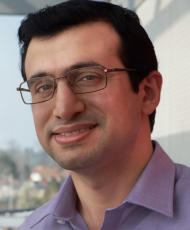Danesh Tarapore

Danesh Tarapore is a lecturer at the Agents, Interaction and Complexity group, Electronics and Computer Science of the University of Southampton. Prior to Southampton he was a Marie Curie research fellow at the University of York. He completed his Ph.D. in Life Science at the University of Lausanne, in collaboration with the Ecole Polytechnique Fédérale de Lausanne (EPFL), in Switzerland. His research interests lie at the intersection of biology, computer science, and robotics. Through the development and application of theoretical models, multi-scale stochastic simulations, and the physical instantiation of biological models in robots, he has addressed a diverse range of important problems in division of labour in social insect societies and the immunological maintenance of self-tolerance in the adaptive immune system. He has also successfully applied biological models towards the development of fault-tolerant systems for a wide range of mobile robots, including complex single-robot systems, and large-scale robot swarms. He is now working towards applying his algorithms to robots operating in more challenging outdoor environments, specifically towards the development of resilient swarms of autonomous surface vehicles.
Bio-inspired algorithms for resilient robot swarms
Despite over 30 years of research in robot swarms, characterized as groups of robots coordinating to perform a wide array of tasks (e.g., collectively monitoring large environments), existing swarms are unprepared for long-term autonomy: unable to deal with the fragility of robot hardware, and easily challenged by inevitable changes in their functional environments; they are frail systems that cease functioning in difficult conditions. In this talk, I will discuss my attempts to remedy this situation via the development of algorithms for robot fault-detection and behaviour-adaptation. I will introduce bio-inspired algorithms that, (a) allow a robot swarm to robustly detect common sensor/motor faults in its members, while remaining resilient to changes in their exhibited behaviours (e.g., due to online learning); and (b) assist the faulty robots to adapt to sustained damages by rapidly discovering compensatory behaviours that work despite the damage. Finally, I will outline my long term vision towards developing a family of bio-inspired algorithms, to lay the algorithmic foundations for robots capable of long-term autonomy.
